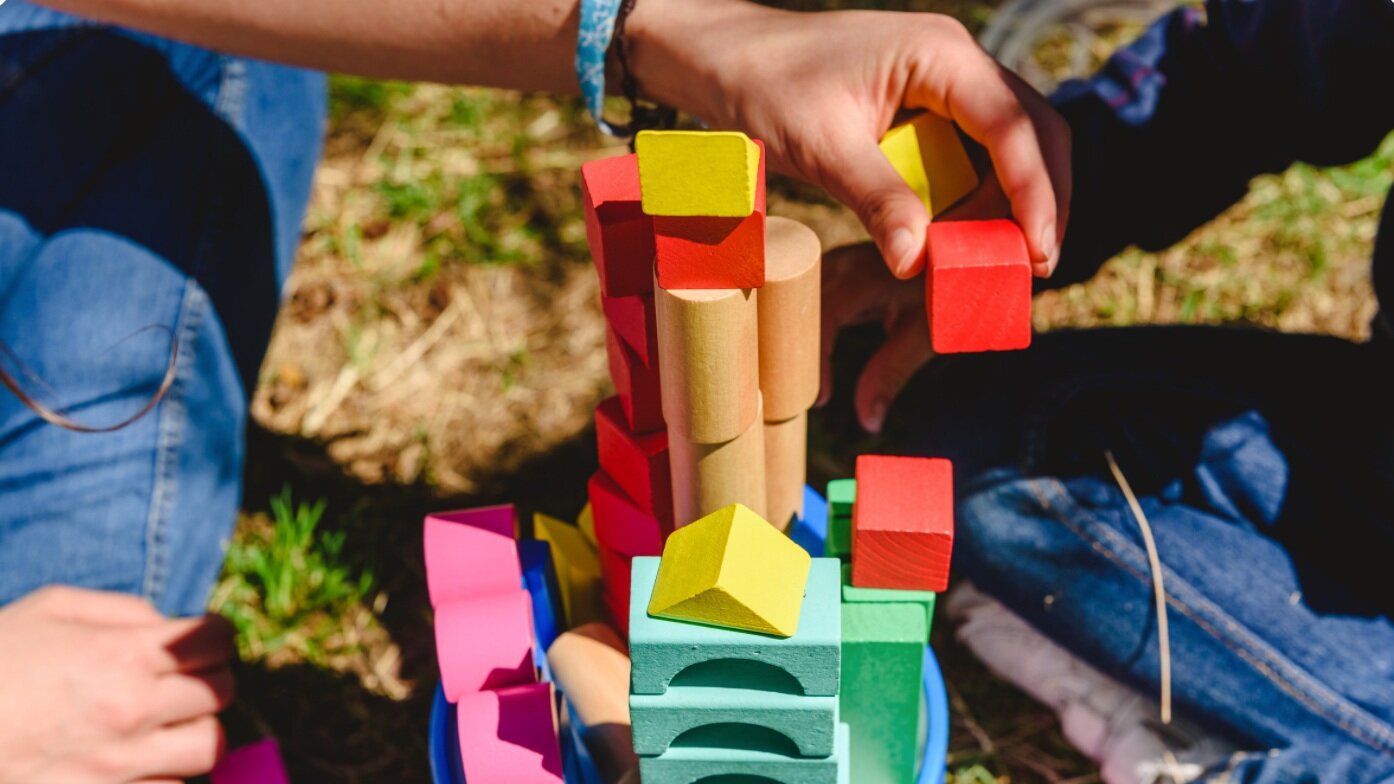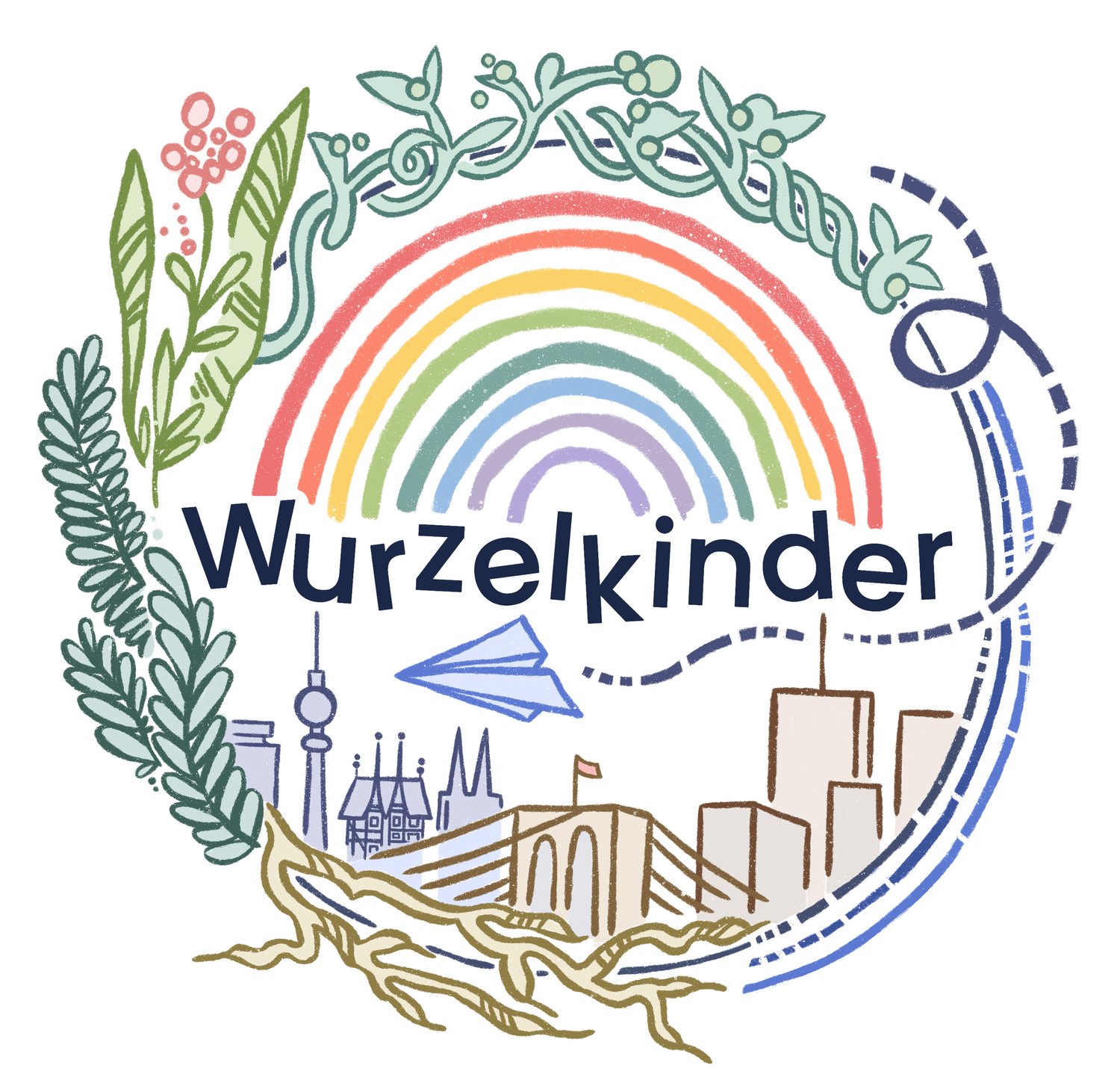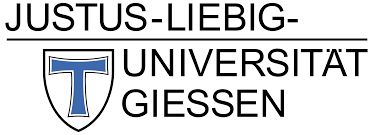
Our educational philosophy.
Successful education is based on the child itself, the educator, and the environment. Our progressive education draws from a combination of philosophies: especially Friedrich Fröbel, Reggio Emilia, Co-Construction Theory, and Montessori. We place equal value on cognitive, social-emotional, and physical development. We recognize that children are best understood and supported in the context of their family, culture, and community. Learning at Wurzelkinder is engaging, relevant, challenging, and impactful.
Our educational philosophy is built around the goal of giving your child roots and wings.
Continue reading to learn what that means in practice.


What are roots?
Roots are the foundation that stays with your child throughout their life. They form the building blocks of character development, learning acquisition, and how to approach the world.
We believe that your child can achieve all three areas themselves if we as teachers and you as parents are patient, encouraging, offering them a deep positive attitude towards the world and allow them to discover new things. Wurzelkinder creates roots by bringing your child into the educational process and making them an active participant. We support and foster the creativity required for solving hard problems that already exists in their own minds.
How we build roots…
Phase-In.
Starting something new is always exciting and it can make you feel a little anxious. The first weeks of school are dedicated to slowly adapt and adjust to the new situation. The developmental psychological process we follow at Wurzelkinder is called phase-in.
Phase-in is a collaborative process between the educator, the parents, and the child. Wurzelkinder tailers each child’s phase-in depending on their individual needs. Each child takes a different amount of time to feel comfortable being dropped off for the whole day.
A successful phase-in paves the way for excellent personal growth and learning at Wurzelkinder and beyond. Imagine you would not feel comfortable with your coworkers at work, would you be able to reach your full potential? We gradually increase the amount of time the children spend with us during phase-in and collaborate with families to set up their child for success.
Anti-Bias education.
Children want to feel like they belong. Anti-bias education is interwoven in our educational style, it shapes how we build our curriculum each day. We believe in the importance of equity, social justice, diversity, and the dream for each child to achieve all they are capable of. Each child should bloom and reach their full growth. We embrace the 4 main goals of anti-bias education: identity, diversity, justice, and activism. Our role is to create a community that embraces all aspects of human differences (but not limited to): language, culture, learning style, ethnicity, family structure, race, religion, sexual orientation, and gender.
Children’s rights.
Children’s rights are a treasure we all have to keep safe. The UN Convention on the Rights of the Child, an international agreement on childhood, describes childhood as a special, protected time, in which children must be allowed to grow, learn, play, develop and flourish with dignity. We want our Wurzelkinder to grow up in a family-like environment, in an atmosphere of happiness, love, respect, and understanding. We prepare our students to live an individual life in society, and in the spirit of dignity, tolerance, freedom, peace, equality, and solidarity.
Collaborative education.
We believe that education happens in a collaboration between the child, the educator, and the environment around them. Listening deeply, responding with interest, leading with questions, and authentic engagement, all foster in-depth learning for life. We thoughtfully observe our students and discuss their interests. We enhance their surroundings to meet their individual needs by providing choices. We live and learn alongside each other. We create new experiences, through hands-on learning. This is how projects are born at Wurzelkinder.
German Immersion.
We apply the German Immersion concept. The German language is not systematically taught but rather used for everyday activities in the classroom. Our highly educated German teachers received their degrees in Germany.
Participation and democracy education.
We encourage our students to be active participants in their education. Together we experience firsthand, what democratic values are and what it means to live in a democracy. Sharing ownership in our daily routines, and collectively deciding on the focus of our curriculum is a powerful tool to instill democratic values.
Conflict management.
We give your child the tools and strategies they need to solve conflicts through effective communication. Here’s what this looks like in practice: “it seems like you are overwhelmed, you can say, stop that is too wild for me.” or “I see you are very angry, I can’t let you hurt your friends, let’s sit together so you can calm down and we can think about another way of managing your frustration in the future”.
Self-directed learning.
We create a deeper and more meaningful learning experience, that will last beyond the memorizing of content. We believe that life activities and classroom experiences have to be connected. As a result of self-directed learning, the teacher is a guide, a supporter for the child to explore the world around them, asking exploring questions and testing hypotheses together. Self-directed learning at Wurzelkinder is not a one-way street.
Sustainability and environmental education.
Starting early on, we want to be part of educating a new generation who feels responsible about the impact we as humans have on forests, air, water, and animals. We engage your child in natural processes that will not only make nature and growth more real for them but also instill a sense of responsibility. For example, our children will plant seeds, observe their growth, nourish them, and discuss the process and how it compares to their own growth.
Wurzelkinder is powered with 100% pollution-free electricity powered by Green Mountain Energy. That reduces greenhouse gas emissions and shrinks our carbon footprint.


What are wings?
Wings are the skills your child learns at Wurzelkinder and at home that they carry through life. Children learn new skills through trial and error. “If I drop the spoon it falls down”, "If I hit the Cajon lightly, it makes a soft sound. If I hit it hard, it makes a loud one.” Tasting new foods, pouring water, cleaning up water dripping on the floor, playing in the mud, trying out your own strengths, and tieing shoes - these are all experiences we truly believe children have the right to control, understand, and use to expand their knowledge. Trial and error also allow your child to build awareness and trust in his or her own abilities and skills, and it forms the foundation of the development of your child's personal identity and self-confidence. With that, your child has wings that help them soar into a bright future.

How we create wings…
Pre-K readiness program.
Wurzelkinder pre-k students get ready for their next big step by participating in a structured multi-disciplinary curriculum. Our curriculum includes literacy acquisition, fostering phonetic and phonological awareness, synthesizing letters to syllables, mathematical concepts like sorting and measuring, numbers and amount relations, counting and cardinality, music, movement, and arts. Our social studies curriculum focuses on anti-bias education, sustainability, children’s rights, and democracy education. Our curriculum is specifically designed to provide a boost for your child based on the New York State Common Core Requirements for Kindergarten.
Seamless education.
We seamlessly get children ready for their next adventure: kindergarten. Studies suggest growing up bilingual teaches your child the underlying concepts of language in general. Your child will seamlessly continue their education in a German School in New York / Germany or an English-speaking school.
Movement and guided language acquisition.
Movement and exercising are important for healthy physical, mental and emotional development. Children have a natural need for movement. Especially now, we should find opportunities for movement whenever possible. Movement exercises help children produce happiness-hormones (Glückshormone) and can help with sleeping problems and restlessness. Besides the social-emotional benefits, exercise builds better memory and concentration. Connecting movement and language acquisition, we create movements that subconsciously teach new vocabulary, syntax, and other grammar basics. The basis for all learning is a healthy body and mind!
Potty training.
No one has to be potty trained at any point at Wurzelkinder. We work with you together. We may ask you to go to the bathroom together for modeling, changing the child standing up near the potties, encouraging them to participate in pulling down pants and taking off diapers so they can begin the process of taking on some of the responsibility for their needs. We view accidents as an important part of independence development and speaking up for yourself.
German language and literacy development.
Using the German Immersion concept, we train linguistic competencies such as grammar, listening comprehension, speech reproduction, and vocabulary on a daily basis. We use mimics and gestures to bring stories to life. We see books as windows to implement cultural awareness and new perspectives, but also choose books to create “Lebensweltbezug”, which means using books as mirrors where children feel represented.
Academics.
Children at Wurzelkinder use academic skills to set up the table, do the daily calendar, create their games, and solve everyday problems (e.g. we only have 10 dinosaurs, not everyone can have one, how do we solve the problem? Or, how many invitations do we need for our Sommerfest or Laternenlauf?). We work on our academic skills across the board:
naming and sounding out letters, words, and numbers
completing and recognizing patterns, forms, and shapes
literacy through books and rhyme
rhythm recognition, and singing
sorting, counting, comparing size, shape, quantity
It is remarkable how quickly children gain knowledge in our collaborative learning environment. “Anschauungsmaterial” and real-life experiences, input, and questions, help children de-contextualize and gain a holistic understanding and a deeper knowledge.
Mathematics and science.
Children ask up to 350 questions a day, many of which deal with fundamental mathematical concepts. Using our students’ own intrinsic motivation to learn about the world around them, we strongly emphasize the German program MINT (STEM in the US). Research suggests that early experience in mathematics and science is critical for academic success in later years.
Music, rhymes, and singing.
Music is an integral component of our daily routine. Children love to explore music. Children enjoy rocking, clapping, singing, and every source of sound. These active responses are reactions to the elements of music, such as rhythm, language, melody and a steady beat. Through music, children can develop skills in math, literacy, and social studies. We sing good-morning songs, use rhymes and melodies for gaining new vocabulary, sing to transit between different activities, listen to stories and use our instruments


We spend our days inside and outside. Children learn with all their senses: we learn while getting messy in our backyard and while exploring the neighborhood.
We fundamentally believe that play, learning, and real-life experiences are three sides of the same triangle. They go hand in hand and are not three separate activities. We believe that children reach their full potential when surrounded by caring and invested adults. With the help of art and science, we teach a love for learning using the German language.
Partnerships.
Our school’s roots are in Germany. Close partnerships and memberships in Germany and the US help us to provide cutting-edge education.







